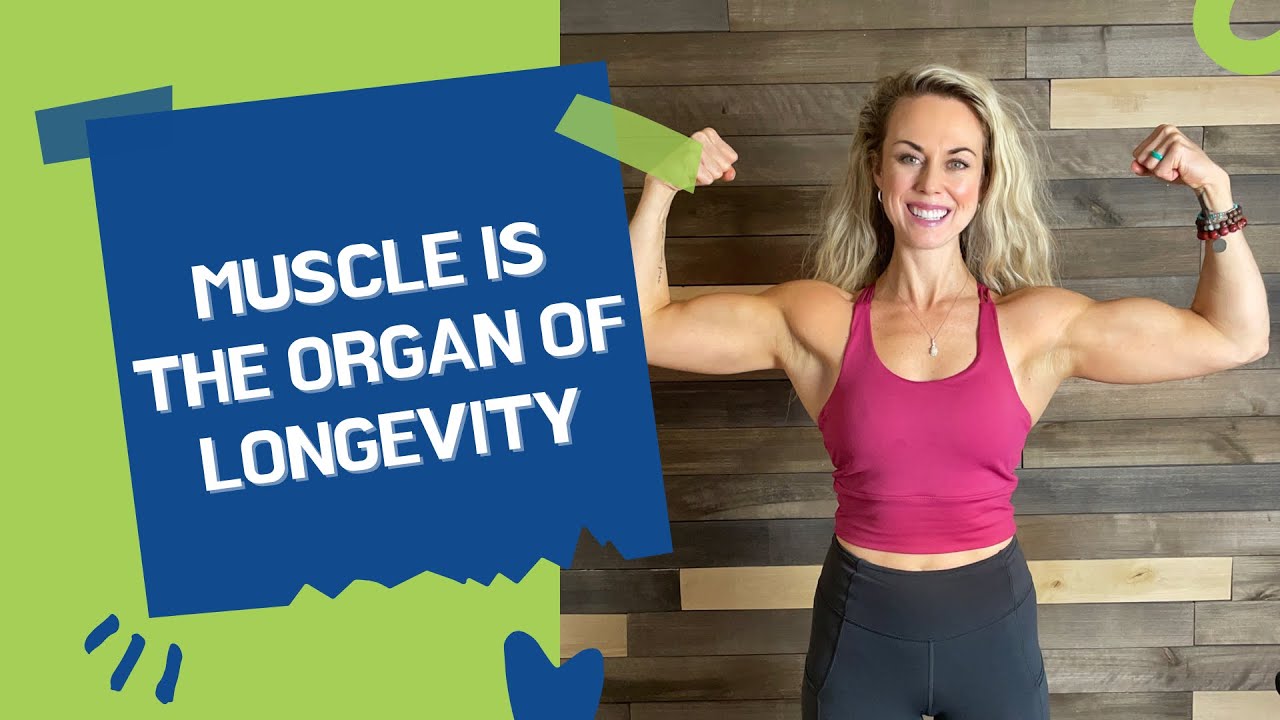Did you know that muscle is your organ of vitality and longevity, and we need a lot more of it?
As we think about optimizing our health and our longevity, we have to critically think about our muscle mass and strength. In fact, it can start declining in our late 30s and 40s. There’s so much opportunity to be able to build and maintain muscle mass as we move into our older years. You can even gain muscle mass after 50 and 60.
We want to think about preventing sarcopenia, which is a loss of muscle mass. That is one of the biggest predictors of poor recovery from falls as we get older. Let’s dive into why muscle is your organ of longevity, what are some things that can happen with poor muscle mass, and what you can do about it.
Rather watch or listen?
Quite simply put, increased muscle mass will have improved health outcomes, not only from a physical standpoint but from a metabolic standpoint. Conversely, low muscle mass is associated with fatigue, injuries, frailty, falls, and even death.
Why is muscle mass important in the body
Now let’s go through why muscle is so important for our body.
1. Provides Structure
Perhaps one of the most obvious things is that it provides us with a structure and integrity to allow us to move dynamically through the world.
2. Reduces Systemic Inflammation
Increased muscle mass decreases inflammation. Conversely, increased adipose tissue or fat tissue is inflammatory in nature, especially coming from the visceral fat. Visceral fat will increase inflammation as well as insulin resistance. So you can see how increased muscle mass will decrease those factors and optimize our blood-sugar metabolism and hormonal function.
3. Regulates Our Metabolism
It is necessary for fat oxidation, glucose metabolism, and detoxification. This is, quite frankly, one of the most important functions of muscle.
4. Whole-Body Protein Metabolism
It plays a central role in whole-body protein metabolism. This is where protein synthesis occurs. Think of it as this reservoir that contains all of our amino acids. We have to consume proteins to be able to optimize our amino acid intake, as well as muscle metabolism.
How to preserve our organ of longevity
As I mentioned, we are all losing muscle mass as we age. When we’re younger, we rely more on things like testosterone, insulin, and growth hormone to optimize our muscle mass. As we get older, we have to rely more on things like nutrition, training, and perhaps for some, supplementation. Now to get into what we need to preserve our organ longevity.
1. Consuming Enough Protein and Essential Amino Acids
As it relates to protein synthesis, we have to consume enough protein. But what does that mean? That’s always a big question.
Consuming enough protein means that for women you are consuming at least 20 to 30 grams of protein per meal and for men 30 to 40 grams per meal. That is assuming that you are eating at least three meals a day.
Now if we want to get a little bit more specific, you can say 1 to 1.5 grams per kilogram of body weight. Now, the next aspect of this is that we have to consume all of the essential amino acids. There is some controversy over this. That means that if you are a vegetarian, you have to think about combining protein sources.
For example, brown rice and peas will make a complete protein. Chicken, fish, or turkey is already a complete protein. We want to think about having all of these essential amino acids consistently throughout the day so that we’re feeding this positive nitrogen balance, which is ultimately our amino acid balance.
2. Progressive Overload Training
You have to have some form of training with progressive overload. That means that it is a structured program where you are consistently changing either the intensity, duration, volume, or weights.
We have to be able to constantly break down protein and build protein. It is a beautiful cycle that changes every day based on what we’re doing.
Essentially, your muscles need to be constantly stimulated. If they’re not stimulated, there’s no way for us to increase or shift our muscle to fat ratio.
Regardless of age, if we take a 20-year-old for example, we know that a 20-year-old is going to be able to build bigger and stronger muscles than an 80-year-old. However, an 80-year-old with proper resistance training and progressive overload is still going to be able to develop larger muscles. We want to consider that age should not be a factor in this and wherever you are right now is a great opportunity to start.
3. Supplementation
Last but not least, there’s supplementation. Supplementation does not work alone, and it is absolutely necessary to have an optimal diet with enough protein as well as a proper training regime. There is enough scientific literature to prove that creatine is a promising supplement that can help with building muscle mass. Essentially, it’s bringing water into the muscle cell to enlarge it which will develop more muscle force and mass.
There you have it… all the reasons why muscle is your organ of longevity. It is so important to think about how you can live into your older years the way that you want and to feel strong and healthy from a metabolic, hormonal, and physical standpoint. My entire career, I’ve been trying to get anybody that will listen to me to strength train because I think it is so valuable. I hope that you consider this if you’re not already.
Give this a shot. Let me know how it goes. If this was helpful, make sure you give it a share. Also, subscribe to our YouTube channel The Movement Paradigm for weekly tips on mindset, nutrition, and movement.

